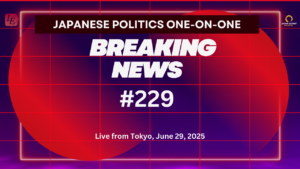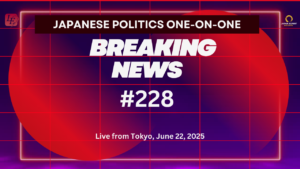Welcome to Synopsis of Episode 180 of “Japanese Politics One-on-One” produced and delivered to you by Langley Esquire and Japan Expert Insights.
If you gain insight from these briefings, consider a tailored one for your Executive Team or for passing-through-Tokyo heavyweights.
A brief introduction of the events that happened in Japanese politics during the week:
- The United States is currently buzzing with activity around the Republican Convention and the now high-potential for a second Trump administration. This has led to significant realignments and background movements here in Japanese politics.
- In sports news, Major League Baseball (MLB) just announced that the Chicago Cubs and the Los Angeles Dodgers will play two Opening Games in Japan next Spring. This is a testament to Shohei Otani’s incredible influence on baseball, not just in the USA but globally: this is a stunning testament.
- On the economic front, inflation crept up to 2.8% in June, slightly overshooting the national average of 2.6% year-on-year. This has put pressure on the Prime Minister, who is struggling to manage the situation, especially with the ongoing challenges related to the Yen.
- We will be giving a briefing on energy storage this Thursday, July 25th at noon. This session will delve into a major policy issue that the Ministry of Economy, Trade, and Industry is focusing on, laying out a long-term energy-policy plan. You will be able to tune in through our YouTube and LinkedIn page.
So, let’s dive deeper and see what-else transpired during this dramatic past week:
Record-Breaking Heat Follows Shortest Rainy Season in Japan’s History
The Japan Meteorological Agency recently announced that the rainy season, known here as “tsuyu,” concluded this past Thursday, right on schedule. The immediate result was a significant spike in temperatures, which everyone felt acutely. The heat in Tokyo is intense, almost like a kiln, with elevated humidity.
Interestingly, this was the shortest tsuyu on record, lasting only 27 days. Last week alone, there were 9,150 heatstroke incidents requiring ambulance services. Fortunately, with people becoming more aware and better prepared after the Meteorological Agency’s announcement, the number of heatstroke cases dropped to 6,194 this week.
As always, it’s crucial to stay hydrated and take care of yourselves. With this summer expected to be particularly hot, extra caution is necessary. Stay safe, everyone!
LDP Prepares for Presidential Election with a New Committee
The Liberal Democratic Party (LDP) announced the formation of the party election committee. This Committee is headed by Lower House lawmaker Ichiro Aisawa (12x, 69yo, Okayama).
This Committee is in charge of organizing the election for LDP President. This includes setting the dates, determining key candidates, organizing the balloting. Currently, several significant figures like Secretary General Toshimitsu Motegi and Digital Minister Taro Kono are positioning themselves as potential contenders. These candidates are assessing whether they can secure the necessary 20 endorsements from their fellow parliamentarians to qualify.
As of now, there are three primary contenders, alongside the incumbent, Prime Minister Kishida. Prime Minister Kishida has not officially announced his candidacy. However, many observers speculate that he will run, despite his current low approval rating. According to Jiji Press it is 12.9%—the lowest for a Prime Minister and the Cabinet in decades.
Parliament will probably not go into session until January constitutionally. Thus, the election for the LDP president will occur before any Lower House election. Depending on outcome, if Prime Minister Kishida retains his position, he will almost certainly reshuffle the Cabinet and may call for an election immediately. Alternatively, if a new contender becomes the LDP president, Prime Minister Kishida and his Cabinet will resign. This will lead to the formation of a new Cabinet and, again almost certainly, an election.
We are entering a crucial two-month period. September 20th is the tentative date for ballot counting. This timeline suggests that the election campaign will commence September 8th and culminate twelve days later. Constitutionally, the ballot must be completed by the end of September, with the two possible Sundays being the 20th and the 27th. While the election could be extended to the 27th, the 20th is the more probable date. The Committee will decide this.
By the end of this upcoming week (July 28th) the LDP will finalize the Members of the Election Committee, consisting of eleven Members. Notably, Motegi, despite being the Secretary General of the LDP, will be strategically excluded from this Committee due to his potential candidacy.
Domino Effect from Kickback Scandal Triggers Major Political Setback for Hagiuda
On Thursday, the LDP faced notable developments involving Koichi Hagiuda, former Chairman of the Policy Research Council of the LDP. He is one of the key figures from the Abe faction, which consisted of five prominent members after former Prime Minister Shinzo Abe’s assassination. Initially, the group included six members. However, Hakubun Shimomura left, leaving five: Hagiuda, one of them. He was closely associated with Abe and became embroiled in the kickback scandal. There he received a significant amount of money. However, the amount he received was just below the threshold of ¥20 million yen ($127,615 US dollars) between 2017 and 2022. The latter was the timeframe used to quantify the amount of kickbacks each Member received.
Anyone who registered more than 20 million yen in kickbacks faced consequences such as removal from the LDP or the loss of their party seats. Hagiuda, falling just below this threshold, was required to give up his party seat. Despite this, he held the position of Tokyo Regional Chairman of the LDP.
Additionally, in the recent Tokyo governor election, where nine assembly members were to be elected, the LDP aimed to increase its representation from four to seven members. However, they ended up with only two, and one of the LDP members who lost was from Hagiuda’s election district! This poor outcome, combined with the LDP’s failure to meet its target, resulted in a significant loss of face for Hagiuda. Consequently, he resigned from his position in the Tokyo chapter of the LDP. The resignation marked a major setback for his political career.
Manabu Horii Resigns Amid Kickback Allegations
On Thursday, another significant event unfolded involving an LDP Member from the Lower House, also from Tokyo, also from the Abe Faction. Manabu Hori (4x, 52yo, Tokyo), a former Olympic speed skater, resigned from the LDP. However, he did not resign from his parliamentary seat. The public prosecutor’s office searched his offices and home Wednesday & Thursday (and continuing) following allegations that he was distributing money from the kickback scandal among his constituents for various purposes such as condolence money, wedding gifts, and other forms of expressing gratitude. This money was linked to the long-running kickback scandal that has been ongoing underground in Japanese politics for the last 20 years.
The LDP, aiming to distance itself from the scandal, pushed for his resignation, as the general public currently views them with significant disdain. This has affected their political influence, even to the point (one can surmise) where the winning candidate for Tokyo Governor did not seek an LDP endorsement. The Constitutional Democratic Party, seizing the opportunity, fought hard to unseat the governor through their candidate, Renho, who ultimately came in third place.
The LDP is currently in the middle of a scandal, with significant repercussions for its members. Mr. Hagiuda, a prominent figure in the Seiwa-kai (Abe faction), has seen his influence diminish significantly due to the kickback scandal. Although he remains in the Lower House and wields considerable power, his reputation has been seriously damaged.
Adding to the turmoil is the resignation of Manabu Hori from the LDP following allegations of distributing kickback money among his constituents. This incident highlights the ongoing issues of dirty politics and the intertwining of money and business for which the LDP is the target of ongoing criticism.
These scandals have placed the LDP in a precarious position, with its reputation severely tarnished. The party is now on tenterhooks, struggling to maintain its standing amidst growing scrutiny and criticism.
LDP and Komeito Take Swift Action to Close Election Billboard Loophole
The LDP, along with the Komeito, have been active in addressing a recent controversy involving the Anti-NHK party. This controversy revolves around the NHK party’s use of billboards for political candidates. The NHK party, which had 26 candidates, sold some of their allotted billboard slots to people, generating revenue in the process. While this maneuver did not technically breach any laws, it raised ethical concerns.
In response, the LDP and Komeito acted swiftly. On Friday, they collaborated to close this loophole, demonstrating the power and influence they wield even when the Diet is not in session. This action underscores how the LDP and Komeito, when united, can effectively control legislative processes. Together, they hold a majority in both the Lower and Upper Houses, enabling them to push through bills and adjust regulations as needed. This recent move highlights their capability to rapidly respond to and resolve political issues, ensuring that the legislative framework remains robust and adaptable.
Insights into the Upcoming CDP Leadership Election
In September, the Constitutional Democratic Party (CDP) will also undergo a leadership election. This process mirrors the LDP’s own leadership selection and is critical in shaping the future of Japanese politics. The CDP, currently led by Kenta Izumi, faces its own internal challenges. Izumi, young, articulate, and on his first term as leader, has seen his fair share of controversies and leadership struggles.
The recent Tokyo governor election highlighted these issues. The CDP, with its candidate Renho, aimed to make a strong showing. Renho, a prominent figure with extensive experience in the Upper House, ran a vigorous campaign. Despite her efforts, including aligning with the Communist Party for additional support, she was unable to secure the governorship. Instead, the incumbent governor, Yuriko Koike, won, and the CDP’s strategy did not yield the desired results.
Renho’s campaign demonstrated the CDP’s capability but also exposed its vulnerabilities. The results of the election indicated that the CDP and its candidates, while making gains, struggled to consolidate enough support to secure top positions. The vote was divided among several candidates, including Shinji Ishimaru, who finished second, and Renho, who came third. This division of votes further complicated the CDP’s position.
The upcoming leadership election in September is set against this backdrop of internal conflict and public scrutiny. Notably, influential figures such as Ichiro Ozawa and former Prime Minister Yoshihiko Noda are making their voices heard within the party. Ozawa, a former LDP heavyweight now aligned with the CDP, and Noda, a former prime minister, are both critical of Izumi’s handling of recent challenges. Their involvement adds further complexity to the leadership race.
As the CDP navigates these turbulent waters, the future of its leadership remains uncertain. If Izumi does not prevail, his Secretary General (who may be both an ally and a rival) would be next in line. The dynamics of Japanese politics often resemble those of Washington, D.C., where personal alliances and rivalries play a significant role in shaping outcomes.
Komeito Leader Yamaguchi Signals Potential Transition?
Natsuo Yamaguchi (8x, 81yo) currently holds the leadership of Komeito. He has been at the helm for 15 years. His long tenure has established a strong alliance with the Liberal Democratic Party (LDP), but it’s worth noting that Prime Minister Kishida does not have the same rapport with Komeito as former Prime Minister Abe did.
Yamaguchi has hinted at a potential leadership change, signaling that he may step down. Although the Komeito convention is scheduled for September, Yamaguchi has announced in a recent press release that he will remain in his position until the next Lower House election, which he suggested could occur in the Fall. This statement could be a strategic move or an indication of the expected timing for the next election, depending on the LDP’s process for selecting its new president.
As we transition from one political shakeup to another, the current period is relatively quiet. The Diet has concluded its sessions, and the focus is shifting to the LDP’s upcoming presidential election. The outcome of this election will likely influence the timing and nature of the Lower House election. For this reason, it is a critical development to watch.
Notable Movements of Key Figures Within the LDP
Over the past week, there has been notable movement within Japanese politics, although some key figures have been relatively quiet. Prime Minister Kishida has been actively performing his duties. He is hosting the Pacific Nations summit from Wednesday to Friday. Th summit garnered significant media coverage.
Among the prominent figures, Taro Kono, Yoshihide Suga, and Toshimitsu Motegi have made headlines with their statements and activities. Motegi, a likely contender for the prime ministership, has subtly criticized Kishida. He has suggested that a three-year term should be sufficient to achieve policy goals. Additionally, he has implyed that it might be time for a change in leadership.
In contrast, Ishiba Shigeru has adopted a more supportive stance toward Kishida. He has downplayed the Prime Minister’s faults and offered a cooperative tone. By doing so, he has positioned himself as a potential ally should Kishida decide to run for re-election or not run at all.
Taro Kono has drawn attention by criticizing the Bank of Japan and the Ministry of Finance for their handling of the yen’s weakness. This move, though somewhat unusual for a minister, seemed intended to align with populist sentiments similar to those expressed by Donald Trump about currency strength. However, Kono faced backlash from Chief Cabinet Secretary Yoshimasa Hayashi and Finance Minister Shunichi Suzuki, leading him to retract his comments and downplay the situation.
As the LDP prepares to select its new president, the field of potential candidates is still taking shape. While Kishida, Motegi, Ishiba, and Kono are prominent, the positions of other figures like Suga and Aso remain less clear. The next two months are to bring further developments as candidates make their intentions known and political alignments solidify.
Ministry of Defense Scandal Continues to Escalate
The ongoing scandal within Japan’s Ministry of Defense continues to escalate, revealing significant issues regarding the handling of confidential information. Recently, over a hundred members of the Self-Defense Forces (SDF) and personnel within the ministry have received reprimands. All of them have also received punishments for their roles in the scandal. The Defense Chief has resigned. The Defense Minister, however, has opted to just forgo one month’s salary as a symbolic gesture of accountability.
This scandal has garnered intense scrutiny from both within and outside the LDP. Critics argue that the Prime Minister and his administration have not done enough to address the situation. The leaks have been contained within the SDF so far. They are seen as a serious breach, especially given Japan’s aspirations to join the Five Eyes intelligence-sharing coalition. Some have raised concerns about Japan’s reliability in handling sensitive defense information. Some pundits suggest that the country’s security practices are not up to par.
The timing of this scandal is particularly problematic for the Prime Minister, who had recently participated in the NATO summit in Washington, D.C., and later met with the German Chancellor to discuss defense collaboration. The scandal undermines Japan’s credibility in international defense circles, especially as it seeks to strengthen its military alliances and participate in joint training exercises with other countries’ Air Force fighter pilots.
The Japanese government has already made legal adjustments to address economic and military security concerns. However, implementation and adherence to these new regulations have been problematic. The Defense Ministry’s failure to properly manage confidential information and the lack of awareness about the strictness of security protocols have highlighted significant gaps in their practices.
Moving forward, the Ministry of Defense will introduce substantial changes. These changes will likely involve tightening confidentiality agreements and improving training for personnel to ensure compliance with security laws. The situation remains fluid. Many expect further developments as the government works to rectify the issues and restore trust in its defense capabilities.
Pacific Island Nations Summit Held in Tokyo
The recent summit of Pacific Island nations held at the Prince Hotel in Shibakoen, Tokyo, marked a notable event in regional diplomacy. Eighteen islands attended this gathering, the first in seven years due to the COVID-19 pandemic. Many of them were represented by their Prime Ministers. The significance of the meeting was underscored by the high-profile attendance and the focus on strengthening ties with Japan.
The summit emphasized collaboration across several crucial areas. Discussions centered on enhancing technology partnerships, improving connectivity through infrastructure projects like undersea cables, and addressing climate change through sustainable development initiatives. Additionally, the summit aimed to promote people-centered development and bolster regional security. This included sharing defense assets and improving security cooperation among the participating nations.
Japan’s strategic focus on these areas highlights its intent to reinforce its relationships with Pacific Island nations in the face of growing Chinese influence. China has been expanding its presence in the region with construction projects and a police presence in Vanuatu, signaling its increasing sway. In response, Japan, along with the United States and Australia, is actively working to strengthen its ties with Pacific countries. Efforts include providing Coast Guard cutters to the Philippines and enhancing regional security cooperation.
The timing of the summit was significant, coinciding with China’s own diplomatic activities. China held a separate summit with the Solomon Islands and Vanuatu, further emphasizing the competitive nature of regional geopolitics. Both Japan and China are vying for influence among Pacific Island nations. This dynamic is likely to drive further developments and initiatives in the near future.
Domestic Bankruptcies in Japan Continues to Surge
In Japan, domestic bankruptcies are on the rise, with a 22% increase year-on-year, and the trend appears to be accelerating. Experts are concerned that there could be up to 10,000 bankruptcies by the end of the year. Several factors have contributed to this surge.
During the COVID-19 pandemic, the Japanese government extended low-interest loans and subsidies to help companies stay afloat despite reduced revenues. These loans had a three-year grace period, which has now ended. As companies begin to repay these loans, many are struggling, particularly those in the service and retail sectors. This reality is leading to a higher rate of business closures.
Additionally, the labor shortage exacerbates the situation. Japan’s population is declining and the pool of young graduates is shrinking. These trends have made it increasingly difficult for businesses, especially small and medium-sized enterprises, to find and retain staff. This issue exists also in the government sector, where interest in bureaucratic positions has waned significantly. The Self-Defense Forces, for example, only managed to recruit half of their target this year.Economic pressures are also contributing to the crisis. Rising production costs and a weaker yen have led to increased prices for imports, including food and clothing. This inflation has reduced consumer spending, further impacting sales and financial stability for many businesses. The combined effect of these factors, alongside the ongoing economic challenges post-pandemic, is creating a difficult environment for companies across Japan.
Leadership Candidates Focus on Currency Depreciation Amidst Economic Uncertainty
The yen closed at $/¥157.48 on Friday, reflecting a continued weakening trend. This depreciation has raised concerns about Japan’s competitive edge and the need for a stronger currency. The weakening yen has become a focal point for potential leadership candidates. Furthermore, figures like Motegi and Kono are positioning themselves to address this issue as they vie for leadership roles.
There is speculation that the yen could potentially weaken further, possibly reaching $/¥170. Richard Katz highlighted this in a recent article, noting that experts expect significant volatility. Prime Minister Kishida has acknowledged the situation. He has admitted that more economic pain may be on the horizon and expressed regret while the government works on solutions.
Japan Hosts Major Joint Air Exercises with European Allies
The joint air exercises involving Eurofighters from Germany, France, and Spain are currently taking place in Japan. The exercises will continue over the next 15 days starting from this past Friday. This significant drill will see 30 aircraft augmenting Japan’s Air Self-Defense Forces across various locations. The locations will include Chitose, Hokkaido, and Misawa, as well as Ibaraki. Japanese F-2s and F-15s will participate alongside these European and American fighters, some of which are coming from exercises in Alaska.
This exercise follows the NATO Summit and has been in preparation for years, though it has only recently come into the spotlight. It reflects ongoing efforts in military cooperation and readiness. Additionally, Japan and the Philippines recently formalized their Reciprocal Access Agreement, enhancing defense collaboration. Joint exercises between the Japanese Coast Guard and the Philippine Coast Guard in Tokyo Bay followed the agreement.
From July 22nd to 25th, the exercise known as “Nippon Skies” will see Japan’s Air Self-Defense Forces partnering with Germany’s Luftwaffe for the first time. This reflects a broader shift in Japan’s defense posture, moving beyond its traditionally pacifist stance. In August, further large-scale drills will continue to demonstrate Japan’s evolving military capabilities and partnerships. These drills will include Italy’s and other EU fighter jets,
Japan Sets Another New Records in Tourism
Tourism in Japan has reached new heights, with a record-breaking influx of tourists. Currently, there are 1 million more visitors than at the peak before COVID-19. By the end of the year, Japan expects to welcome 17.78 million tourists. The largest number of visitors come from South Korea, followed by China, Taiwan, and the USA. Tourists are significantly contributing to the Japanese economy, injecting approximately 8 trillion yen (around 50 billion USD) this year.
In response to this trend, authorities have introduced a new registration fee for climbing Mount Fuji. This move aims at managing the increasing number of visitors. Additionally, the Prime Minister has proposed building hotels in national parks. Regulations previously restricted activities in national parks to camping and visitor activities only. This initiative aims to cater to both domestic travelers and international tourists. It should help to distribute tourist activity more evenly across Japan. The country is facing economic challenges, including a strong yen making overseas travel expensive for Japanese citizens. Regardless, the government is focusing on expanding and improving tourism infrastructure to accommodate and attract visitors. The Prime Minister has set an ambitious target of 60 million tourists by 2030. This includes both inbound and outbound travel. This goal encompasses 20 million outbound Japanese travelers and up to 40 million incoming tourists.
Questions & Comments from The Audience Answered Exclusively during the Briefing
- Ishimaru is boosting his online presence. But even if he gets all the young voters, it might not be enough to change or influence older voters. What do you think will happen with the Tokyo governorship in the future?
- With joint exercises involving EU nations, PM Kishida attending the NATO convention, and NATO opening an office in Tokyo, what do you think about these events? Do they suggest Japan might join NATO soon?
- When will the political posters be removed?
- How does Mr. Hori’s situation compare to Elon Musk’s $44 million donation to the Trump campaign? What does this massive difference say about Japanese political views?
- Yamanashi Prefecture has introduced fees, and now Shizuoka Prefecture will follow. Since both prefectures share Mt. Fuji as a cultural site, why are they implementing these fees at different times?
Are you familiar with “Tokyo on Fire”? Episodes can be found on YouTube “Langley Esquire”: excruciatingly-gained insights sifted over 40 years in-country! Entertainingly presented.
“Japanese Politics One-on-One” episodes are on YouTube “Japan Expert Insights”.
To learn more about the complexities of advocacy and lobbying in Japan, read this article.
Join the Success!
Experience exceptional, personalized solutions designed to meet your business’s specific needs. Discover how we can elevate your operations to the next level.




